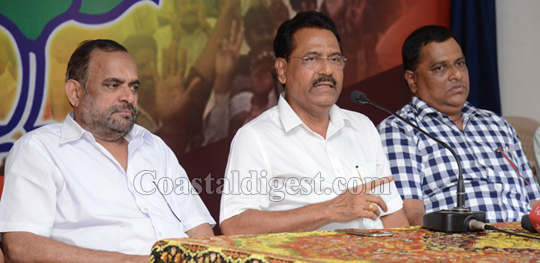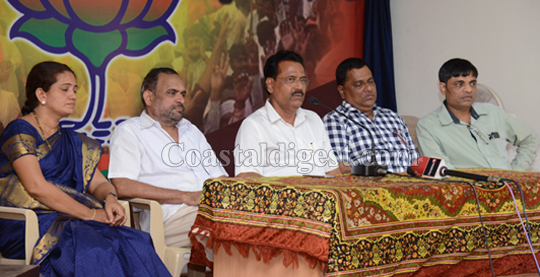Mangaluru, May 12: The severe water crisis in this coastal city is in fact an artificial creation by the Mangaluru City Corporation to help the mafia engaged in sand extraction in the Netravathi, according to BJP leader and former district-in-charge minister Krishna J Palemar.

Addressing media persons here on Thursday the minister said: “Usually the MCC officials fix gates at the Thumbe vented dam, supplying water for both drinking and industries, during November-December. But this year the gates were installed during January-February, a delay by over a month in installing the gates to store water at the dam. It was specifically to help the mafia engaged in sand extraction in the river on the upstream of the dam.”
The minister alleged that if the dam was full it was difficult for mining. The corporation has succumbed to the pressure by sand mafia. He said if water would have been stored in the dam from November itself it would have helped in re-charging of ground water on the river bank and the storage would have lasted for more days thus helping the civic body to draw water for more days.
He alleged that the move to install gates late was also to ensure that the business of supplying water through tankers thrived. The former Minister in the BJP-led State government said that now the corporation and the district administration was “shedding crocodile tears” over the scarcity.
Mr. Palemar said that supplying water through tankers without checking the quality of water being drawn from wells was dangerous to health. “It might result the breaking of communicable diseases,” he said.
The former Mayor M. Shankar Bhat said here on Thursday that the corporation should first disconnect unauthorised pipelines from the two 18-MGD (million gallons a day) capacity main pipelines of the corporation supplying water from Thumbe dam to the city. Water was being stolen between Thumbe and Padil through unauthorised pipelines.
Addressing presspersons along with the former Minister J. Krishna Palemar, he claimed that when he was the Mayor he had disconnected 95 such unauthorised pipelines. As a result there was five per cent difference in the quantity of water being pumped at Thumbe and received in the city.
Now the difference was 35 per cent. It showed that there were many such illegal pipelines now, he said.





Comments
Opposition pagal hogayaa.... Dont know what to say.... New story....
Send all these people to modijis somalia.... People are waiting to eat them alive...... Ha hA
Add new comment